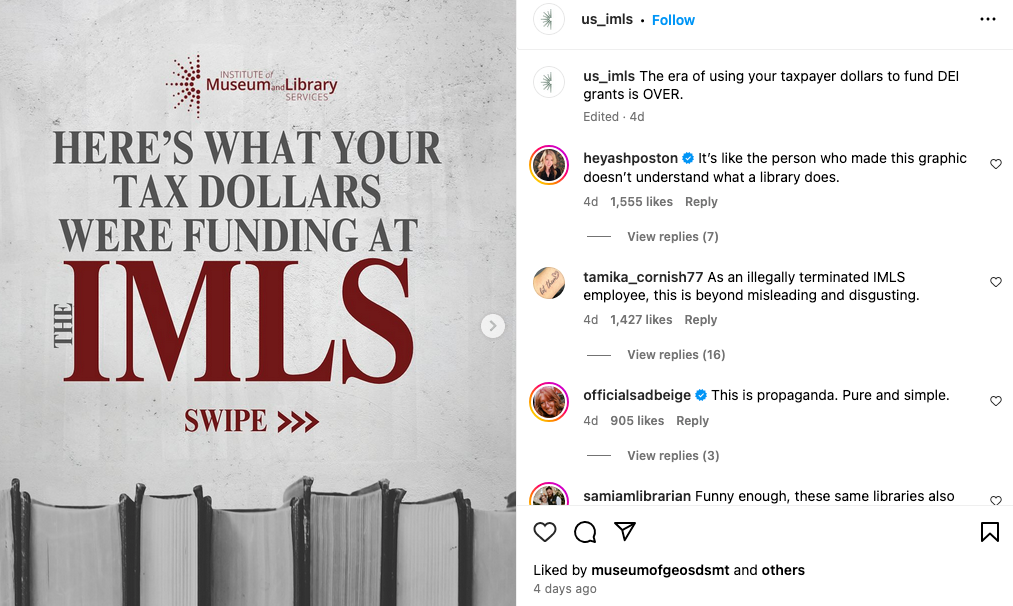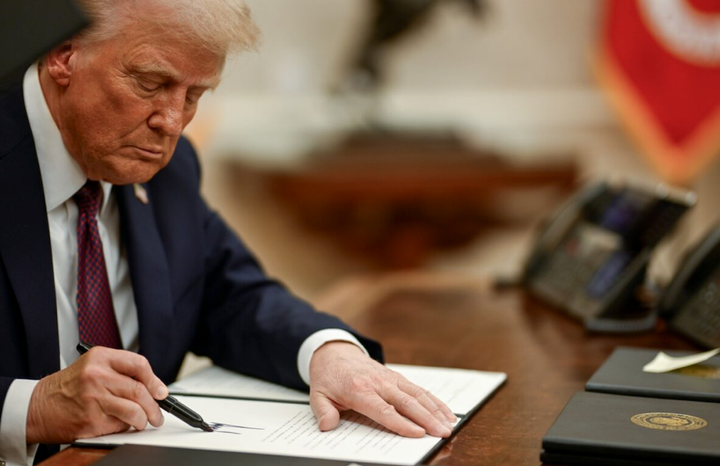‘Time is of the Essence’: ALA Sues Trump Administration to Save IMLS
The ALA suit comes just days after a coalition of state attorneys general filed a similar federal lawsuit in Rhode Island also seeking to stop the Trump administration’s dismantling of the IMLS.

The American Library Association on April 7 filed suit in federal court in Washington D.C. to block the Trump administration’s dismantling of the Institute of Museum and Library Services. The suit, which is joined by AFSCME/AFL-CIO as co-plaintiffs, argues that Trump’s March 14 executive order and subsequent actions taken by acting director Keith Sonderling to shutter the agency are unlawful, and will cause irreparable harm if not stopped.
“Given the ongoing harms suffered by Plaintiffs and Defendants’ intent to inflict imminent future harm, Plaintiffs now file this Complaint and will seek a preliminary injunction directing Defendants to reverse these unlawful actions and to halt any further steps to dissolve the agency until the Court has an opportunity to more fully consider the issues on the merits,” the complaint states.
The ALA suit comes just days after a coalition of state attorneys general filed a similar federal lawsuit in Rhode Island seeking to stop the Trump administration’s dismantling of the IMLS along with six other agencies targeted by Trump. Like that suit, the ALA action also argues that Trump’s actions violate the Constitution’s “Separation of Powers” and “Take Clauses,” as well as the Administrative Procedure Act. Both suits also feature an “ultra vires,” claim, which asserts that Trump’s order to dismantle the IMLS, which is specifically authorized by Congress, exceeds the executive’s authority.
"No statute, constitutional provision, or other source of law authorizes Defendants to dismantle IMLS, to suspend or cancel grants IMLS is statutorily required to disburse, to eliminate the Board, or to prevent IMLS from accessing congressionally appropriated funds," the complaint states. "Congress is the only entity that may lawfully dismantle the agency, not the President and certainly not DOGE."
The complaint also suggests that Sonderling’s appointment is unlawful, failing to meet the requirements set out by Congress for a director—specifically that IMLS directors by statute “must either have special competence with regard to library and information services or special competence with regard to museum services.” IMLS directorships alternate between library and museum services every four years.
Notably, the ALA suit also adds a First Amendment claim to the mix, based on Sonderling’s March 20 statement promising to “restore a focus on patriotism, ensuring we preserve our country’s core values, promote American exceptionalism and cultivate love of country” at the agency.
“This statement makes clear that Defendants intend to deny IMLS funding or terminate IMLS grants to recipients or for programs that have expressed, advocated for, or are merely associated with, political, personal, or moral viewpoints disfavored by Defendants,” the suit alleges. “Namely, viewpoints about American history and culture that the President and his administration do not like.”
Indeed, an April 4 social media post on the IMLS’s Instragram account declared that “the era of using your taxpayer dollars to fund DEI grants is OVER,” alongside a selection of grants the agency has apparently canceled.

“It is only a matter of time before Defendants cancel en masse IMLS grants that fund activities at libraries across the country. Even if grants are not canceled, the severely reduced workforce will not be able to effectively and timely process grant payments and applications,” the complaint argues, adding that many IMLS grantees have already expended funds they expect to be reimbursed for. “Time is of the essence.”
The suit seeks a declaration that that Trump's order and the agencies actions are unlawful, and a preliminary injunction blocking officials from shutting down IMLS unless authorized by Congress, and ordering IMLS to "return IMLS and its employees and grantees to their status prior to March 31, 2025," including the reinstatement of all employees, and the restoration of funding to both the agency and its grantees. The suit also seeks to block IMLS from "imposing unconstitutional conditions on obtaining IMLS grants."
More Details
Meanwhile, like the suit filed by state attorneys last week, the ALA’s complaint also fleshes what’s been happening at the agency in the wake of Trump’s March 14 order, and Sonderling’s subsequent appointment.
“In the days following the executive order, members of the Department of Government Efficiency (DOGE) gutted the agency,” the ALA complaint states, noting that the administration initially placed the entire staff, roughly 75 employees, on a 90-day paid administrative leave, later recalling a dozen staff members: “three statutorily mandated employees, a group of five lawyers and an HR specialist, the CFO, and exactly one program officer each for libraries and museums.”
Days later, on April 3, IMLS sent “termination notices to virtually all IMLS staff on administrative leave,” the suit adds.
The complaint also confirms that on April 4, Sonderling fired all 23 members of the National Museum and Library Services Board, the entity statutorily mandated to advise the agency. The move comes after the board sent two letters to Sonderling advising him of the agency’s obligations under the law and seeking a meeting—an outreach that reportedly received no response.
Meanwhile, on April 1, 2025, IMLS began cancelling grants, including “statutorily required grants to several state libraries.” In all, the complaint notes that IMLS currently has “over 650 open awards under the grant programs it administers to libraries, totaling over $450 million,” including $266.7 million in grants awarded in 2024.
The complaint points out that the grant cancellations are already impacting libraries across the nation, noting that at least two libraries in Mississippi were forced to stop providing access to digital streaming platform hoopla, due to the suspension of IMLS grant funding.
The IMLS will also no longer be able to collect data as it has done “for decades” through its Public Libraries Survey, the suit points out, data which comprises “information about library visits, circulation, collection sizes, hours, staffing, electronic resources, operating revenues, expenditures, and the number of service outlets.” Such data “cannot be obtained anywhere else,” the complaint adds. “If research is halted, even if not permanently, damage to longitudinal research, which relies on connecting past and future data points, will be irreparable.”
The ALA itself is also facing significant direct harm. “ALA receives approximately $2,456,454 in grants annually from IMLS and will thus suffer a direct financial injury as a result of Defendants’ actions to dismantle IMLS,” the complaint acknowledges, adding that the association will “need to halt some of its public programs work and cancel contracts with vendors” as a result of the cancellations.
“Defendants’ actions have also harmed ALA’s ability to serve its members and, if they persist, will continue to harm ALA,” the suit goes on, explaining that, in response to the administration’s actions, ALA has already been forced to divert "significant time and resources to addressing its members’ questions and concerns about the shutdown of IMLS" and its potential impact.
“IMLS grants are critical to the functioning of libraries around the country, particularly in rural and poor areas, and libraries on Native American tribal lands," the suit stresses. "As a result of the cancellation of IMLS grants, many libraries will have to fire personnel, default on contracts, and restrict or end provision of essential services. Some may even have no choice other than to close down.”
In a statement, ALA president Cindy Hohl reiterated the vital role libraries play in our democracy, "from preserving history to providing access to government information, advancing literacy and civic engagement, and offering access to a variety of perspectives,” she said. “These values are worth defending. We will not allow extremists to threaten our democracy by eliminating programs at IMLS and harming the children and communities who rely on libraries and the services and opportunities they provide.”


